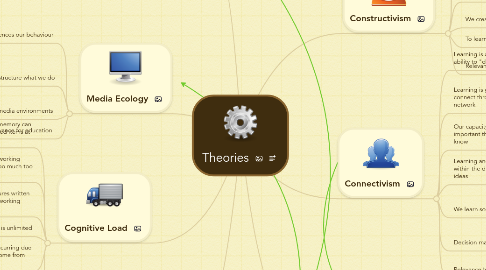
1. Cognitive Load
1.1. The number 7: Working memory can only handle 7 disconnected items at once
1.2. Overload: occurs when working memory is working on too much too fast
1.3. Schemas: Memory structures written in long term memory by working memory
1.4. Long Term Memory is unlimited
1.5. Automation: unconscious process occurring due to well developed Schemas, these come from effective repetition
1.6. Relevance for education
1.6.1. Can help guide the structure of lesson planning
2. Media Ecology
2.1. Media influences our behaviour
2.1.1. How we communicate
2.1.2. What we can express and understand
2.2. Media and technology structure what we do
2.2.1. Through the influence of messages
2.2.2. Through the structure technology imposes upon us
2.3. The study of media environments
2.3.1. Online activity
2.4. Relevance for education
2.4.1. Can inform digital literacy
3. Social Construction of Technology or SCOT
3.1. Interpretive flexibility
3.1.1. An item or "artifact" means different things to different groups
3.2. Relevant social groups
3.2.1. Users
3.2.2. Producers
3.3. Our actions shape technology
3.4. To understand why a technology is accepted we must look to the social world
3.5. Relevance for education
3.5.1. Can inform digital literacy
4. TPACK
4.1. A way to explore the integration of technology into teaching
4.2. A framework that illustrates the relationship between three aspects of teaching
4.2.1. Content knowledge: what we know about a subject
4.2.2. Pedagogical knowledge: what we know about the art of teaching
4.2.3. Technological knowledge: what we know about the technologies available
5. Constructivism
5.1. How people learn
5.1.1. based on observation and scientific study
5.2. We each develop our own understanding of the world
5.2.1. through experience
5.2.2. through reflection
5.3. New things must be reconciled with previous knowledge
5.3.1. changing what we believe
5.3.2. discarding the new as irrelevant
5.4. We create our own knowledge
5.5. To learn is to explore
5.5.1. We ask questions and assess
5.6. Relevance for education
5.6.1. Can assist in identifying stages of learning, and evaluating curriculum structure
6. Connectivism
6.1. Learning is about increasing our ability to "do something"
6.1.1. Increase our skill level in a particular task
6.1.2. Develop new abilities in new areas
6.2. Learning is greater when we connect through an existing network
6.2.1. Community network, online or not
6.2.2. A database or information
6.3. Our capacity to know more is more important than what we already know
6.4. Learning and knowledge exists within the diversity of opinions and ideas
6.5. We learn so we can be current
6.5.1. Accuracy is crucial here
6.5.2. Up-to-date knowledge, like in "best practices"
6.6. Decision making is a learning process
6.7. Relevance for education
6.7.1. Can inform learning strategies that use technology, and help increase the flexibility of the curriculum
7. Philosophy of Teachnology
7.1. What I believe about the integration of technology in teaching
7.1.1. What role I see for technology in my classroom
7.1.2. How I view relationship between students and technology
